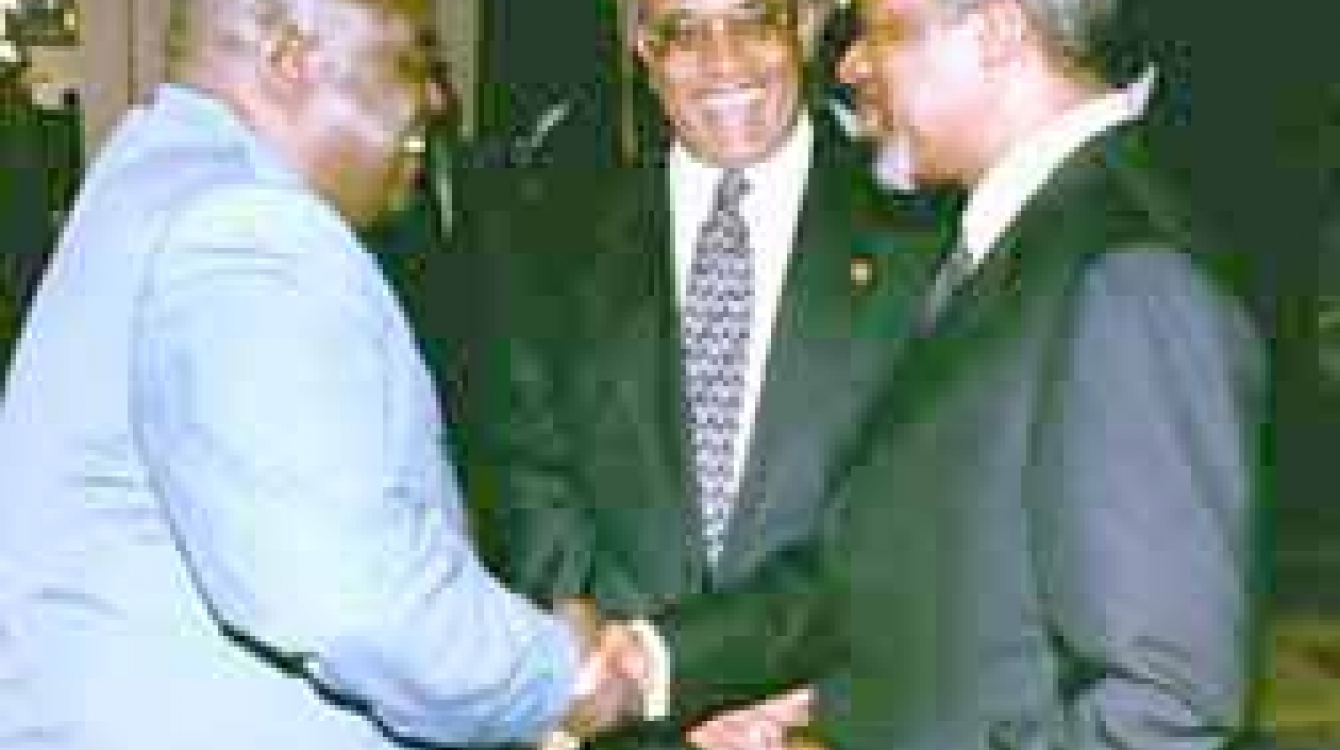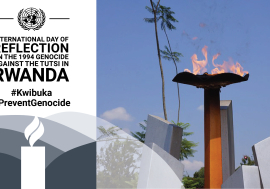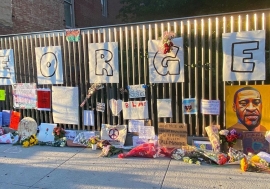Annan asserts primacy of human rights
In a series of decisive statements and actions in June, UN Secretary-General Kofi Annan emphatically identified respect for human rights as a key priority for all states, one which is indivisible from the universally accepted goals of democracy and sustainable development. In enunciating this position on human rights -- one of the most contentious issues in international diplomacy -- the Secretary-General added significantly to the authority with which champions of this cause can press their case, particularly within Africa, where genocide in Rwanda and virulent internal strife in Burundi, Liberia and Somalia have made protecting human rights and instituting democratic rule a compelling priority.
Mr. Annan chose the setting of the June summit of the Organization of African Unity (OAU) in Harare, Zimbabwe, for the most explicit rendering of his emerging vision of how the principles of the UN Charter should be embodied in national and international policy-making. "We will succeed," he said on 2 June, "to the extent that we embrace the inviolability of human rights" alongside "the primacy of democratic rule and the imperative of sustainable development."
He pressed his case further on three important occasions in the days that followed: in his first meeting with President Laurent Désiré Kabila of the Democratic Republic of the Congo; in his 4 June comments in London on the coup d'état in Sierra Leone; and in his 12 June appointment as UN Human Rights Commissioner of Mrs. Mary Robinson, the President of Ireland and an outspoken advocate of human rights.
Addressing in Harare the African Heads of State whose support had been instrumental in electing him Secretary-General, Mr. Annan made an impassioned plea for placing human rights at the centre of any programme designed to promote democracy and sustainable development. He said he found "truly demeaning" the assertions of those who think human rights concerns are "a luxury of the rich countries for which Africa is not ready," while others "treat it as an imposition, if not a plot, by the industrialized West."
"Do not African mothers weep when their sons or daughters are killed or maimed by agents of repressive rule?" he asked African leaders. Among them were President Pasteur Bizimungu of Rwanda, where a rebel force had put an end to the genocide perpetrated by Hutu extremists, and President Kabila, whose rebel army has been accused, during its military campaign against the Mobutu regime, of perpetrating atrocities against Rwandese refugees who included the Hutu extremists allied with the Mobutu regime.
The Secretary-General's emerging vision on translating the principles of the UN Charter into policy.
The Secretary-General left no doubt about the answer. "I say this to you, my brothers and sisters: human rights are African rights, and I call upon you to ensure that all Africans are able fully to enjoy them."
In making the link between sustainable development, democracy and human rights, Mr. Annan emphasized Africa's need for external assistance. But he also made a powerful appeal for Africans to take full charge of their own destiny as they try to build peace through a more just society. "In the final analysis," he said, "what stands between us and the future is ourselves."
Then, in his 3 June meeting with President Kabila, the first issue the Secretary-General raised was the humanitarian situation of Rwandese refugees. In that regard, Mr. Annan obtained the President's agreement to grant access to the eastern part of the country for the UN Office of the High Commissioner for Human Rights to investigate reports of gross violations of human rights. When the Congolese authorities subsequently raised objections to the initial composition of the investigating team, Mr. Annan vowed to quickly appoint a new team and send it into the field. "What is important here is to get to the facts," he said (see article "Reconstruction a priority for Congo").
Mr. Annan stopped over in London on his return from the OAU Summit, and in a joint press conference with Mr. Robin Cook, the UK Foreign Secretary, stated in remarkably strong terms that the coup in Sierra Leone was unacceptable. Pointing to the OAU condemnation of the coup and the stand taken by Sierra Leone's neighbours, Mr. Annan hinted that he might not be unsympathetic to the use of force by these neighbours to restore the democratically elected government: "It may have to come to that," he said, although naturally "I would prefer negotiations."
A week later, on 12 June, Mr. Annan announced what he said was "one of the most important appointments I will probably have the opportunity to make during my term, [one that] is very important for the entire international community." This was the appointment of Irish President Mary Robinson as the UN High Commissioner for Human Rights. She is "an extraordinary leader...who will bring dynamism, credibility and leadership...for the UN in the human rights field," the Secretary-General said.
Mr Annan's stance reflects the growing strength of forces, including in developing countries, pressing for human rights.
The appointment was a bold one: Mrs. Robinson's outspoken and activist approach has won her a wide following. A lawyer by training, she has served on the International Commission of Jurists and has special expertise in human rights law.
As President of Ireland she emphasized the needs of developing countries, becoming the first and virtually only head of state to visit Somalia following the crisis there in 1992 and Rwanda after the 1994 genocide. But there is also a worry among some member states that her outspoken approach may be inappropriate for a UN official, given the lack of universal consensus on what constitute the core elements of human rights.
Mr. Annan's explicit elaboration of his position on human rights in his speech to the OAU is all the more forceful -- and credible -- for the fact that he himself is African: a non-African Secretary-General could not have spoken in this manner without causing offence. The boldness of his stance on democracy and human rights -- which are increasingly being seen as vital components of the criteria for defining legitimacy for governments -- will make it much easier for Africa's democrats to campaign in national and global forums for humane and democratic rule.
Bold as the Secretary-General's stance on human rights is, it also reflects the growing strength of forces, including within the developing world, which see respect for human rights as a cornerstone of good governance.
The Secretary-General's package of UN reforms, announced on 16 July, also heightens the prominence of human rights concerns within the organization. Human rights has been designated one of the five core areas around which the UN's work will be restructured. The two human rights offices will be consolidated and a single secretariat established to provide the new Commissioner with a strong institutional basis for putting human rights at the heart of the policy-making process.









